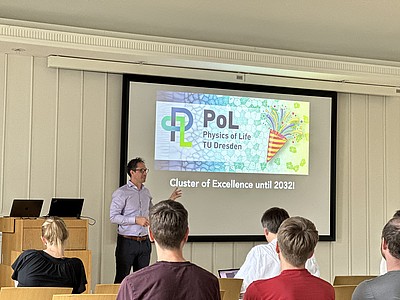News
Mini-Symposium “Polymer Research Towards the Physics of Life”

On June 3, the IPF hosted a mini-symposium titled “Polymer Research Towards the Physics of Life”, co-organized with TU Dresden’s Cluster of Excellence Physics of Life (PoL). The cluster was recently selected for a second funding phase (2026–2032) under Germany’s Excellence Strategy.
Researchers at PoL investigate the principles that govern the dynamic spatio-temporal organization of life at the molecular, cellular, and tissue levels—often using approaches grounded in fundamental and applied polymer science. At the same time, polymer research at the IPF is increasingly driven by bioinspiration, informed by a mechanistic understanding of the complex functionalities of living matter. This shared scientific focus formed the basis for the symposium’s main objective: to strengthen and expand collaborations between PoL and the IPF.
The program featured a compelling lineup of local and international experts:
- Otger Campàs (PoL, TU Dresden) discussed the mechanical control of vertebrate body axis formation.
- Ellen Sletten (UCLA) introduced next-generation optical diagnostics and responsive therapeutics facilitated by poly(2-oxazoline).
- Oliver Bruns (National Center for Tumor Diseases) explored macroscopic Raman and fluorescence imaging in the shortwave infrared.
- Ivan R. Minev (IPF) presented conductive hydrogels for exogenous sensing and cell fate control.
The scientific program concluded with an open discussion, followed by an informal get-together with drinks and snacks, providing ample opportunity for networking and exchange. The symposium was made possible through the generous support of the Friends-of-IPF Association of Supporters.
04.06.2025

